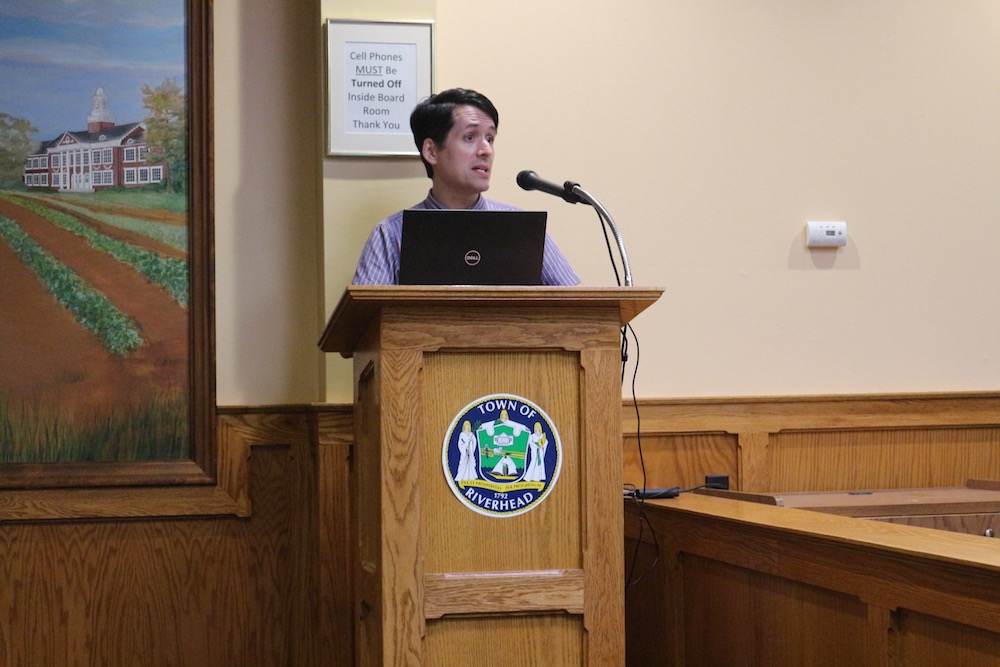Riverhead considering resolution to oppose offshore drilling


After a presentation Thursday from Oceana, an international ocean conservation advocacy group, Riverhead Town officials are contemplating passing a “sense” resolution to oppose a federal offshore drilling plan.
“Some of the towns on the East End are adopting a sense resolution,” said Supervisor Laura Jens-Smith, adding that she felt it was important for the board to be informed if it’s something they move forward with.
During the work session, Brian Langloss, a campaign organizer with Oceana, highlighted the current federal draft proposal plan and what would be at risk in New York.
In January, Department of the Interior Secretary Ryan Zinke announced a plan to expand offshore drilling by opening 90 percent of the nation’s Outer Continental Shelf to energy exploration. It would reverse Obama-era protections that limited drilling on U.S. coastlines. The current program puts 94 percent of the OCS off limits, according to the DOI.
Opening the Atlantic to drilling, Mr. Langloss said, would put the economy and jobs at risk. The amount of oil recovered in the water off New York wouldn’t even be worth the effort, he said.
“The amount of oil [the government] is looking to recover, based on current rates of use, would be about 10 days of oil and eight days of gas,” he said, which would in turn jeopardize a $39 billion industry such as tourism, fishing and recreation, totaling over 400,000 jobs. “This is not a good business deal.”
Mr. Langloss, a native of the Mississippi Gulf Coast, knows this first hand. During his presentation, he displayed a photo of his grandfather’s shrimp boat, Shirley Rose.
“You saw a lot of boats like this. Up and down the coast, people lived off of shrimping. They had restaurants and hotels because people wanted to come see the life on our water,” he said.
It all changed in 2010, when the BP Deepwater Horizon disaster caused over 200 million gallons of oil to spill into the Gulf of Mexico. Obvious environmental impacts aside, Mr. Langloss said local industries felt secondary effects as a result.
“There wasn’t just the cleanup of the oil,” he said. “In order for these coastal towns to make people realize it’s safe to eat our seafood and come to our beaches, the local towns had to dish out money —a lot of it —to try and repair the reputation of their local tourism economy.”
The proposal drew swift opposition in New York, where an initial lone public hearing was scheduled for Albany. After weeks of pressure from Congressman Lee Zeldin (R-Shirley), a hearing was held on Long Island where environmentalists and local officials across party lines testified against the plan.
Mr. Zeldin said it was important for DOI officials to hear directly from Long Islanders who would be most impacted by the decision.
In May, Gov. Andrew Cuomo put forth “Save Our Waters,” legislation that would prohibit offshore drilling infrastructure in New York waters. Even if that law passes, a spill offshore of Virginia or Maryland could impact our waterways, said Aaron Virgin, vice president of Group for the East End. “Water knows no political boundaries, so if there’s damage done, we’re all in the same boat.”
Similar legislation is moving through statehouses in California, Florida, Delaware and Maryland.
“So what you’re saying is that you don’t want drilling anywhere,” Councilwoman Jodi Giglio said during the work session.
Not necessarily.
“We oppose expanded drilling,” Mr. Langloss said, pointing to two areas in the gulf that are currently in oil production. “When you hear about America exporting rather than importing energy, those areas are part of that happening,” he said, adding that drilling for oil on other areas is “completely unnecessary.”
Ms. Giglio inquired about statistics on how much oil is being imported. “I don’t have the exact numbers you’re looking for, but we’re exporting more than we’re importing currently,” Mr. Virgin said.
Councilman Jim Wooten said it was a good move.
“We’re slowly weaning ourselves off of oil, we’re trying to get cleaner energy,” he said.
Council members Catherine Kent and Tim Hubbard were not present at the work session discussion.
Similar sense resolutions have been passed in East Hampton and Southampton. While the Town of Brookhaven does not pass sense resolutions, their town board sent a consensus letter opposing the plan to the DOI secretary earlier this year.
An initial 60-day public comment period on the draft proposed program closed in March. The Bureau of Ocean Energy Management is currently reviewing all received comments and is expected to release its final proposed 2019-2024 National OCS Oil and Gas Leasing Program as soon as November, Mr. Langloss said.
Photo caption: Brian Langloss, a campaign organizer with Oceana, at the Thursday meeting. (Tara Smith photo)








